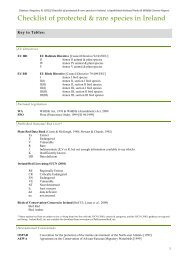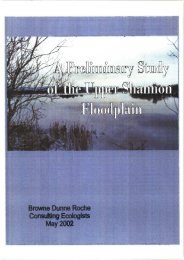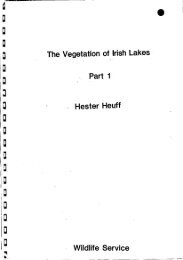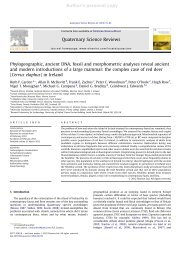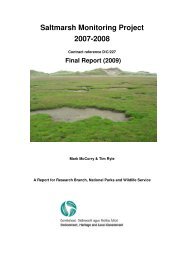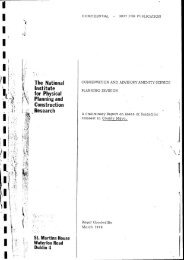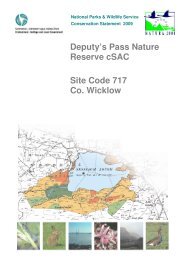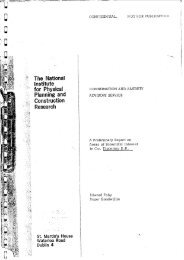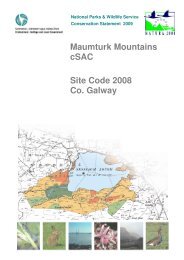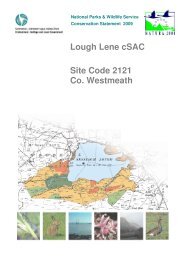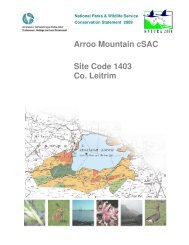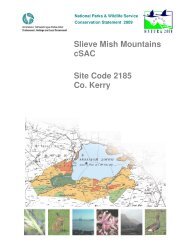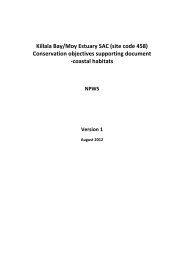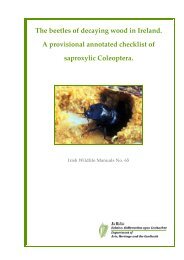The Role of Kelp in the Marine Environment - National Parks ...
The Role of Kelp in the Marine Environment - National Parks ...
The Role of Kelp in the Marine Environment - National Parks ...
Create successful ePaper yourself
Turn your PDF publications into a flip-book with our unique Google optimized e-Paper software.
cnidarians, predatory polychaetes, e.g., scale worms, syllids, hesionids, phyllodocids<br />
and nereids, isopods and <strong>the</strong> large decapods such as lobster and crab.<br />
Drift algae, <strong>in</strong>clud<strong>in</strong>g <strong>the</strong> different kelp species, are washed up on our shores mostly<br />
dur<strong>in</strong>g <strong>the</strong> autumn and w<strong>in</strong>ter months but this event can occur at any time depend<strong>in</strong>g<br />
on when storms happen. Even before <strong>the</strong> drift weed is washed ashore, it acts as a<br />
float<strong>in</strong>g refuge and dispersion method for crustaceans and juvenile fish (B. O’<br />
Connor, pers. obs.). <strong>The</strong> contribution kelps make to this drift weed is not known but<br />
Steneck et al. (2002) quote a figure <strong>of</strong> between 60–99% from Mann (2000) for eastern<br />
Nova Scotia. As <strong>the</strong> weed rots on <strong>the</strong> shore, it provides a valuable resource <strong>of</strong> organic<br />
matter for amphipods and hypoxic/anoxic-tolerant <strong>in</strong>faunal opportunistic polychaetes<br />
such as Malacoceros and Capitella. <strong>The</strong>se <strong>in</strong> turn act as a food resource for bird<br />
species such as Curlew Numenius arquata (B. O’ Connor, pers. obs.). Bustamente<br />
and Branch (1996) work<strong>in</strong>g on <strong>the</strong> west coast <strong>of</strong> South Africa, studied <strong>the</strong> most<br />
abundant <strong>in</strong>tertidal grazers (Patella sp) and filter feeders (Mytilus, Aulacomya and<br />
Gunnarea) and <strong>in</strong>vestigated <strong>the</strong>ir connection with <strong>in</strong> situ local production and that<br />
generated from subtidal kelp forests. <strong>The</strong>y found that <strong>the</strong> selected species used kelpderived<br />
detritus as <strong>the</strong>ir ma<strong>in</strong> source <strong>of</strong> organic carbon and nitrogen. <strong>The</strong>y also found<br />
that more generalised <strong>in</strong>tertidal grazers relied ma<strong>in</strong>ly on <strong>the</strong> <strong>in</strong> situ epilithic algal<br />
species and that kelp-derived detritus represented more than 65% <strong>of</strong> particulate<br />
organic matter while phytoplankton contributed only 6%. <strong>The</strong>y conclude that subtidal<br />
macrophyte production greatly <strong>in</strong>fluences <strong>the</strong> structure <strong>of</strong> <strong>in</strong>tertidal rocky shore<br />
communities on <strong>the</strong> west coast <strong>of</strong> South Africa.<br />
Soares et al. (1996), who also worked <strong>of</strong>f <strong>the</strong> South African coast around Cape<br />
Agulhas found that <strong>the</strong> <strong>in</strong>faunal surf clam Donax serra was significantly negatively<br />
impacted by stranded kelp. <strong>The</strong>y exam<strong>in</strong>ed 12 beaches and found that densities <strong>of</strong><br />
adult clams were significantly higher on beaches that had low stranded kelp cover but<br />
did note that this did not apply to juveniles. <strong>The</strong>y postulate that kelp strand<strong>in</strong>gs<br />
<strong>in</strong>terfere with Donax feed<strong>in</strong>g and burrow<strong>in</strong>g activities, dislodg<strong>in</strong>g animals <strong>of</strong><br />
<strong>in</strong>creas<strong>in</strong>g size gradually downshore to <strong>the</strong> saturation and surf zones, where adult<br />
populations are eventually established. <strong>The</strong>y go on to note that kelp gulls predate<br />
upon <strong>the</strong> dislodged clams.<br />
30



